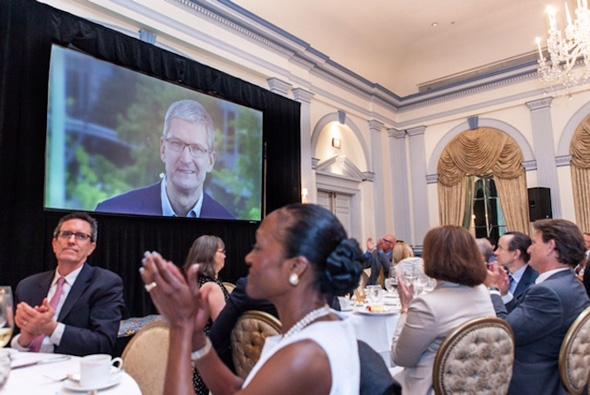On Monday, the Electronic Privacy Information Center recognized Apple CEO Tim Cook at its Champions of Freedom Awards dinner. It was the first time EPIC chose someone from private industry to receive the award. In a fervent speech, Cook outlined Apple’s stance on privacy and criticized government initiatives to undermine encryption standards.
TechCrunch reported from the event. “Like many of you, we at Apple reject the idea that our customers should have to make tradeoffs between privacy and security,” Cook said. “We can, and we must, provide both in equal measure. We believe that people have a fundamental right to privacy. The American people demand it, the Constitution demands it, morality demands it.”
Cook went on to call out other big tech companies, like Facebook and Google, that use customer data to lure advertisers. “They’re gobbling up everything they can learn about you and trying to monetize it. We think that’s wrong. And it’s not the kind of company that Apple wants to be.”
It’s nice to hear the leader of a major tech company talk about taking a rigorous approach to offering privacy services for customers. And Apple has been consistent with this party line. At the All Things Digital D8 Conference in 2010, Walt Mossberg asked Steve Jobs about Apple’s take on data privacy. Jobs explained:
We’ve always had a very different view of privacy than some of our colleagues in the Valley. We take privacy extremely seriously. As an example, we worry a lot about location in phones. We worry that some 14-year-old is gonna get stalked and something terrible is gonna happen because of our phone. … Privacy means people know what they’re signing up for in plain English and repeatedly.
But it’s hard to maintain that idealism. Apple co-founder Steve Wozniak told Esquire last week that he feels resigned to a problematic future for privacy. “I don’t try to concern myself about things that we humans don’t have a way to stop,” he said. “I don’t see [privacy issues] going away with the nature of the Internet, encoding techniques, and encryption. It’s very hard to be private now.”
And Apple has had its share of privacy gaffes. In April 2011, less than a year after Jobs made the comments above, Apple had a location-tracking scandal related to the legality of its data-collection practices. The Korea Communications Commission investigated the company and eventually fined it (a very small sum). “This time, Larry Page and Sergey Brin may be the ones snickering,” Kashmir Hill wrote for Forbes.
Of course, no company is perfect, and fear of particulars shouldn’t keep Tim Cook or anyone from talking about their ideals. But Apple has also faced questions over the years about how long it stores Siri data and its implementation of two-factor authentication. Plus there’s the small issue of the prominent nude-photo leak from iCloud. As Slate’s David Auerbach pointed out, the breach stemmed from a security vulnerability that Apple should have been aware of for months and could have potentially corrected before the breach occurred. He also notes that Apple strongly encourages its users to keep their photos and other data in iCloud. It’s even the default setting for Camera Roll backups.
There are other signs that Apple wants to push everyone into the cloud, too. For example, the iPhone 6 and 6 Plus come in 16GB, 64GB, and 128GB options, from lowest to highest price. That means that if you don’t have a lot of money or don’t want to spend a lot on an iPhone, you’re being forced into 16GB of onboard storage, which isn’t very much space. Owners of those phones may feel especially inclined to keep apps, photos, videos, or other media in the cloud. And Apple seems to agree that it’s not enough space to store anything locally, since the next price tier up has four times the storage.
Still, Cook is definitely talking the right talk about what’s wrong with the privacy approaches of other companies. “You might like these so-called free services, but we don’t think they’re worth having your email, your search history and now even your family photos data-mined and sold off for God knows what advertising purpose. And we think some day, customers will see this for what it is,” he said, pointedly calling out Google services, including the new Google Photos.
Cook was also firm about government involvement in encryption backdoors. He said:
Some in Washington are hoping to undermine the ability of ordinary citizens to encrypt their data. We think this is incredibly dangerous. We’ve been offering encryption tools in our products for years, and we’re going to stay on that path. … So let me be crystal clear — weakening encryption, or taking it away, harms good people that are using it for the right reasons. And ultimately, I believe it has a chilling effect on our First Amendment rights and undermines our country’s founding principles.
It’s commendable to even talk about playing the long game with privacy and cybersecurity decisions. Since so much of the discourse right now is about short-term fixes instead of long-term idealogical approaches, Cook’s stance may actually make a difference. Apple’s approach carries weight. But in the true long view, we have to consider the possibility that Apple will be tempted to throw these noble ideals out the window at some point to help its bottom line. If it ever does, the blogosphere will have a field day digging up Cook’s comments.
